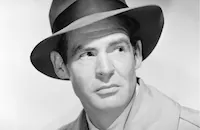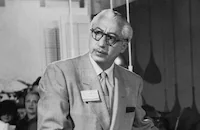About Mrs. Leslie

Brief Synopsis
Cast & Crew
Daniel Mann
Shirley Booth
Robert Ryan
Marjie Millar
Alex Nichol
Sammy White
Film Details
Technical Specs

Synopsis
One morning, Mrs. Vivien Leslie, the owner of a Beverly Hills rooming house, advises tenant Nadine Roland not to worry about the ailing Lan McKay, pointing out that the young man's "illness" is just a hangover. Vivien does express concern for elderly lodgers Mr. and Mrs. Herb Poole, who are visiting their dying, hospitalized daughter, but tells Nadine that she must learn to take life's tragedies in stride. Despite Vivien's advice, Nadine nurses Lan, and Vivien gives him some coffee. A bit later, Lan, dressed and recuperated, thanks Vivien but complains when she lectures him about his reckless driving. Lan then drops by his sister Felice's house to deliver a birthday present to his mother and argues with his domineering older brother-in-law Lewis, whose wealthy lifestyle Lan both resents and envies. After Lan returns to the rooming house, Vivien, inspired by the noisy, thoughtless behavior of neighbor Pixie Croffman and her teenage friends, begins to reminisce about her romantic past: Shortly before World War II, Vivien, known as Vivien Keeler, is singing in a Greenwich Village bistro when she meets refined, quiet George Leslie. George and Vivien hit it off, and while taking a walk in Central Park the next day, George asks Vivien if she would like to go to California with him for six weeks, as his paid "companion." At first, Vivien rejects the invitation, assuming that George is looking for a sexual relationship, but George, who describes himself as an overworked manufacturer, insists that he wants nothing more than friendship. Vivien agrees to go but is fired by her boss at the club. Although surprised when Jim, George's chauffeur in California, addresses her as "Mrs. Leslie," Vivien does not correct him and soon becomes the mistress of George's beautiful seaside house. During the day, Vivien swims and fishes with George, and in the evening, keeps him company while he reads books on his favorite topic¿the American Civil War. One night, George receives a mysterious long distance phone call, and later, Vivien hears him crying out in his sleep. Vivien goes to George's room to comfort him but does not ask him about his nightmare. After spending a carefree day fishing and smashing wine glasses at a local eatery, George gets another phone message and announces he is returning East the next day. Again Vivien does not question George and agrees to see him again in a year. Back in the present, Vivien comes out of her reverie and tells Lan that he is welcome to use her piano that evening to practice his dance routines. Lan then drives Nadine, an aspiring actress, to a television audition and, after dropping her off, meets talent agent Fred Blue. Having seen Lan with Nadine, Fred agrees to come by the rooming house to watch Lan's routine on condition that Nadine is also there. Nadine, meanwhile, fails to impress the television producer, who dismisses her as "starlet fluff." Later, at the rooming house, Vivien, who has agreed to babysit Pixie, tries to have a conversation with the sullen teenager and earns her wrath when she sends her rowdy friends away. After Pixie accuses Vivien of lying about her marital status and storms off, Vivien recalls more about her past: Vivien has trouble finding work when she returns to New York but makes ends meet until she and George rendezvous again in California. George soon discovers that Vivien has been learning about the Civil War and, touched by her selfless devotion, gives her some money with which to become more financially secure. Vivien and George part with a kiss, and once back in New York, Vivien opens a dress shop. One night, after the start of World War II, Vivien goes to a movie theater and is stunned when George appears in a newsreel and is identified as aviation great George Leslie Hendersall, the married head of a new aeronautical board in Washington, D.C. Devastated, Vivien runs from the theater and sometime later, when George finds her in her shop, angrily rejects him. George demands that she dine with him and, at the restaurant, explains that he married Evelyn, a former aviatrix, for money but never loved her. While admitting his mistake, George states that for various reasons, he cannot divorce, but begs Vivien to stick with him. Vivien agrees and spends another peaceful vacation in California. Back in the present, Vivien hosts Lan's audition, which features Lan and his female partner dancing the mambo. Fred, however, is more interested in Nadine, who used to run with a wild Hollywood crowd, than Lan's performance and tells him that he has no talent. After Vivien shows Fred the door, Lan asks Nadine out, and the two commiserate over drinks. Though drunk, Lan insists on driving home and almost crashes his car. Sobered by the near miss, Lan tells Nadine his problems, and she admits that her real name is Alice and she is as lost as he. Meanwhile, at the rooming house, Vivien returns to her reverie, remembering the last time she saw George in California: George apologizes for making her live her life in "weeks instead of years," but Vivien insists that she is content. When they kiss goodbye, Vivien has an uneasy feeling, and later, while the rest of New York madly celebrates the end of the war, she reads about George's death on a Times Squares news ticker. Soon after, Vivien learns that, through the discreet actions of Evelyn, she has inherited enough money from George to buy a house. At the rooming house the next morning, Vivien says goodbye to the grieving Pooles, offering her sincere condolences. Nadine then announces that she and Lan are getting married, but Vivien tells her that Lan moved out early that morning. Before Nadine can react, however, Lan returns in a new car, ready to go to Las Vegas. Relieved, Vivien wishes the couple well and advises them to "go for everything" in life.

Director

Daniel Mann
Cast

Shirley Booth

Robert Ryan
Marjie Millar
Alex Nichol

Sammy White
James Bell
Eilene Janssen

Philip Ober

Henry Morgan

Gale Page
Virginia Brissac

Ian Wolfe

Ellen Corby

Ray Teal
Isaac Jones
Maidie Norman

Amanda Blake
Laura Elliott
Percy Helton
Ric Roman
Joan Shawlee
Anne Mccrea

Mabel Albertson
Alberto Morin
Torben Meyer
Edith Evanson
Jack Larson
Judith Landon

Nana Bryant

Pierre Watkin
Kenneth Patterson

Benny Rubin

Jerry Paris
Harry Landers
Frank Carter
Mike Mahoney
Tom Irish
Jane Novak
Martin Mason
Carol Brewster
Joan Valerie
Jeanne Gail

Steve Rowland
Steve Terrell
Maureen Cassidy
Michael Pierce
Norman Ollestad
David Morales
Drew Cahill
Jim Davies
Estelle Etterre
Coy Bronson
Crew
Ralph Axness
Richard Blaydon
Sam Comer
Irving Cooper
Farciot Edouart
Dorothy Fields
Ketti Frings
John P. Fulton
Gene Garvin
Edith Head
Earl Hedrick
Hal Kanter
Harold Knettles
Arthur Krams
Ernest Laszlo
Harry Lindgren
Frank Loesser
Warren Low
Jimmy Mchugh
Richard Mcwhorter
Jim Miller
Hal Pereira
Victor Schertzinger
Wally Westmore
Victor Young

Videos
Hosted Intro



Film Details
Technical Specs

Articles
About Mrs. Leslie
In her long career, Booth had played a wide variety of roles onstage--drama, comedy, and everything in between--but was only known to film audiences as the self-described "old, fat and sloppy" Lola in Come Back Little Sheba. Booth was in her mid-fifties when she took on the role of Vivien Keeler, a sassy, outgoing New York nightclub singer in About Mrs. Leslie. She was perhaps too old to play the younger version of her character, and visibly too old for Ryan. But her warmth is infectious, and her wistfulness as the older, self-styled "Mrs. Leslie" is just right. It is totally believable that the aloof, regretful tycoon would be drawn to her. It's not passion you see between them, it's tenderness.
The creative team behindCome Back Little Sheba--Producer Hal Wallis, director Daniel Mann, and writer Ketti Frings--was also responsible for About Mrs. Leslie. Mann had directed Booth in the stage version of Sheba, and like Booth, he made his film debut with the movie version of that play. They faced a typical challenge of the era in adapting the book on which About Mrs. Leslie was based for the screen. In the story, the couple spends six weeks together in California each year. The Production Code would not allow an adulterous relationship to be portrayed frankly, so the first time the two vacation together, there is a scene when they arrive at the beach house that emphasizes they will be sleeping in separate bedrooms. But the publicity tagline for the film left no doubt about their relationship: "About Mrs. Leslie...and the man she never quite married." The film flopped, and was little seen after its initial release, but its fine performances and romantic longing have made it something of a cult favorite for those who have seen it.
As he aged into his rugged good looks and air of menace, Ryan was able to play a more varied assortment of nuanced roles. His final performance in Eugene O'Neill's The Iceman Cometh, released after his death in 1973, was one of his best, and earned him posthumous rave reviews. Of Booth, Ryan said "she seemed uncomfortable working in pictures." Apparently he was right. Booth appeared in only two more feature films, the drama Hot Spell, and Thornton Wilder's comedy The Matchmaker, both in 1958. She went back to the stage, and in 1961 began her long run as the busybody maid in the television series that made her a household name, Hazel. Those who only know her from that show will be surprised and delighted to discover the work of one of the great American actresses of the twentieth century.
Director: Daniel Mann
Producer: Hal Wallis
Screenplay: Ketti Frings, Hal Kanter, based on a novel by Viña Delmar
Cinematography: Ernest Lazlo
Editor: Warren Low
Costume Design: Edith Head
Art Direction: Hal Pereira, Earl Hedrick
Music: Victor Young
Principal Cast: Shirley Booth (Vivien Keeler, also known as Mrs. Leslie), Robert Ryan (George Leslie Hendersall), Marjie Millar (Nadine Roland), Alex Nicol (Lan McKay), Sammy White (Harry Willey), James Bell (Herb Poole), Philip Ober (Mort Finley), Eilene Janssen (Pixie Croffman), Henry Morgan (Herb Blue), Virginia Brissac (Mrs. Poole)
104 minutes
by Margarita Landazuri

About Mrs. Leslie
Quotes
Trivia
Notes
Voice-over narration, spoken by Shirley Booth as her character "Vivien Leslie," is heard intermittently throughout the film. According to a Hollywood Reporter news item, Paramount purchased the rights to Viña Delmar's novel in June 1950, and tentatively assigned the project to George Stevens. In September 1953 Hollywood Reporter announced that Paul Nathan, story editor and casting director for the "recently dissolved Hal Wallis Productions," was to "start work" on the picture, but the exact nature and extent of his contribution have not been determined. Director Daniel Mann, producer Wallis and screenwriter Ketti Frings also worked with Booth on Come Back, Little Sheba, the 1952 film for which she won an Oscar . A Hollywood Reporter news item adds Fred Sweeney to the cast, but his appearance in the final film has not been confirmed.

Miscellaneous Notes
Released in United States Spring May 1954
Shirley Booth's second film.
Released in United States Spring May 1954













